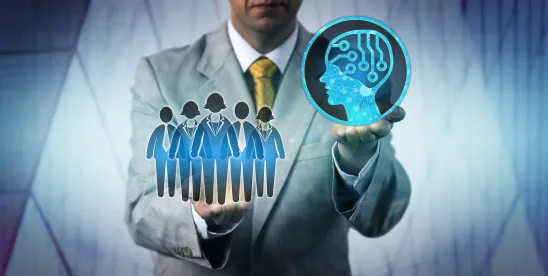On August 9, 2024, Illinois Governor J.B. Pritzker signed HB 3773 into law, amending the Illinois Human Rights Act (IHRA) to expressly regulate the use of artificial intelligence (AI) for employment decisions.
HB 3773 is the second Illinois law that regulates workplace AI. As we previously reported, in August 2019, Illinois enacted the first of its kind statute, the Artificial Intelligence Video Interview Act (AIVIA), which requires employers who use AI-enabled video interviewing technology to provide applicants advanced notice of the use of the AI, information regarding how the AI works and the characteristics evaluated, and obtain prior consent from applicants. And, while not necessarily directed exclusively at workplace AI tools, as we also previously reported, an employer’s use of AI-powered facial expression and screening technology could also implicate the requirements of the Illinois Biometric Information Privacy Act (BIPA).
HB 3773 has a potentially broader application than either AIVIA or BIPA. HB 3773 provides two new definitions:
Artificial Intelligence
A machine-based system that, for explicit or implicit objectives, infers, from the input it receives, how to generate outputs such as predictions, content, recommendations, or decisions that can influence physical or virtual environments.
Artificial intelligence also includes generative artificial intelligence.
Generative Artificial Intelligence
An automated computing system that, when prompted with human prompts, descriptions, or queries, can produce outputs that simulate human-produced content, including, but not limited to, the following:
(1) textual outputs, such as short answers, essays, poetry, or longer compositions or answers;
(2) image outputs, such as fine art, photographs, conceptual art, diagrams, and other images;
(3) multimedia outputs, such as audio or video in the form of compositions, songs, or short-form or long-form audio or video; and
(4) other content that would be otherwise produced by human means.
Under the amendments, employers may not use AI in recruitment, hiring, promotion, renewal of employment, selection for training or apprenticeship, discharge, discipline, tenure, or the “terms, privileges, or conditions of employment” where the AI has the effect of discriminating against employees on the basis of classes protected by the IHRA. In addition, employers may not use zip codes as a proxy for protected classes. HB 3773 also requires employers that use AI in a manner regulated by the IHRA amendments to notify employees that they are using AI for one or more of those purposes.
The IHRA amendments in HB 3773 take effect on January 1, 2026. The Illinois Department of Human Rights must adopt rules necessary for their implementation and enforcement. At a minimum, the rules must address the circumstances and conditions that require notice, the time period for providing notice, and the means for providing notice.
What Should Employers Do Now?
Illinois employers should plan to notify applicants and employees who will be subjected to the use of AI for employment decisions. The terms of the specific notice will depend on the rules promulgated by the Department of Human Rights, and we will continue to monitor the publications of the Department.
Unlike workplace AI laws recently enacted in New York City and Colorado, HB 3773 does not require employers or AI developers to conduct or publicly post bias audits or take other specific measures to avoid biased outcomes. Depending on the circumstances, however, it still may make sense for employers using workplace AI to perform an annual adverse impact analysis. Employees believing that their employer’s use of AI has subjected them to unlawful discrimination, whether disparate treatment or disparate impact, under the IHRA will have the same rights and ability to pursue remedies as with any other claim of employment discrimination. Employers therefore should continue to take appropriate steps to mitigate the risk of biased outcomes when using workplace AI.






 />i
/>i

